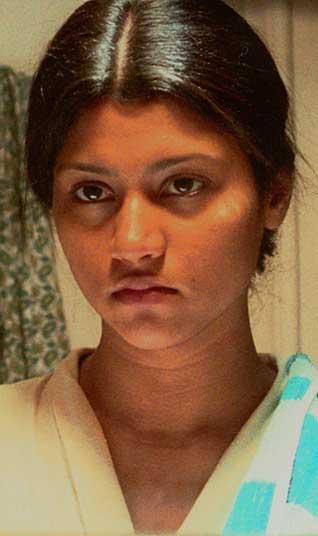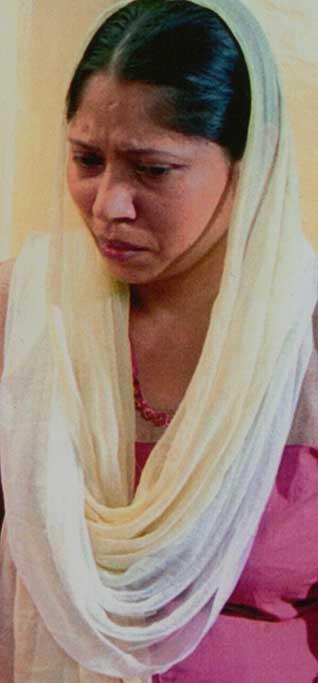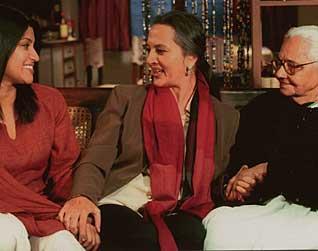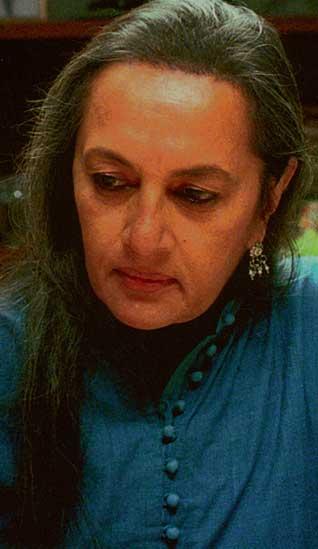Columnists
"Amu" Screens in New York
by NEHA SINGH GOHIL
After worldwide acclaim, Amu, Shonali Bose's much anticipated film about the 1984 anti-Sikh pogroms in New Delhi, launches this Memorial Day weekend in the United States. It will debut in New York City before opening in Los Angeles on June 15th and Edison, New Jersey, in early June.
As I sat back in my cushioned seat at a New York cineplex earlier this week, Punjab was on strike. While I listened to Shonali Bose introduce her debut film, Amu, to an American audience, Sikhs across India were glued to their television screens. As I followed Amu's heroine reliving her Sikh father's death during the 1984 killings in New Delhi, Indian troops poured into Amritsar, Ludhiana, Patiala and countless Punjabi villages, purportedly to keep the peace.
Some things never change. But that's exactly what Shonali Bose has set out to do.
Her daring film starts a much-needed public conversation about what happened during those three chilling days in 1984, when over 5,000 Sikhs were killed in New Delhi alone, in broad daylight and right under the nose of the government of the world's largest democracy. Twenty-three years later, virtually nothing has been done to hold the killers accountable for the massacre. No body counts, no victim rehabilitation, and no justice.
Although inspired by her own work in the Sikh refugee camps as a college student, Bose tells the story from a stranger's perspective. Her goal was to educate outsiders about the 1984 anti-Sikh pogroms and the government's complicity in what happened. What she may not have anticipated was just how much education fellow Indians needed about their own history.
When the film showed in India, Bose said, people around the country had no idea of what had occurred in 1984. Audiences were surprised to learn about the body count and that rioters were handed electoral rolls to target Sikhs.
Still, distributors insisted nobody would want to see a movie about 1984. Indian censors cut out key scenes that blamed government bureaucrats, and gave the movie an Adult rating despite its lack of violence or sexual content.
Their justification? "Why should young people know history that is better buried and forgotten?" Despite their restrictions, the film ran for three months with full house audiences across India.
That was Bose's first victory.
But in my eyes, her biggest success has been educating Sikhs about their own story. In Canada, Bose met some young Sikhs who refused to identify themselves as Indian because of the events of 1984 and the total absence of due process and justice since then. When they saw the movie, and witnessed some Hindus hiding Sikhs to save them from the mobs and helping in the refugee camps after the crisis, it had a "healing effect," Bose remembers.
I grew up on the opposite end of that spectrum. Though I was raised in a Sikh home, and I'm only a few years older than Bose's protagonist, Kajori Roy, I know little more than Kaju did about 1984. My parents didn't speak about it much, and what I know I learned through my human rights work. For Sikhs like me, who are interested in their history but don't always find accessible ways to learn about it, Bose's movie provides an unprecedented chronicle.
I cannot imagine seeing this film as a non-Sikh - not getting the chill up my spine as Kaju watches her father beaten and burned by a crowd; not wanting to scream as a group of Hindus cut a Sikh's hair to hide him; not cringing at the bitter words of 1984 widows who have yet to receive any justice for what happened to their husbands and sons during those three days.
Yet, Bose's depiction has brought Sikh suffering to the global stage. Sitting in a Chelsea movie theater, surrounded by activists, members of the local community, and just a handful of Sikhs, I realized for the first time that what had happened to Sikhs in 1984 was not just about us. It was the same carefully planned government terror, mingled with media-fuelled religious prejudice that we saw yet again in Gujarat in 2002, in Rwanda in 1994, and in Iraq today.
As the screening finished and the evening drew to a close, an elderly lady made her way up to the podium and hugged Bose, sobbing. The woman was a fourth generation Punjabi descendant, she told Bose, and had never been to her forefathers' homeland. Still, she echoed a sentiment felt by many of the Sikhs in the room. "Your storytelling has touched my heart," she said. "Thank you so very, very much."
You can watch the trailer for this film or get more information about screenings in your city at http://www.amuthefilm.com/.
Conversation about this article
1: Inni Kaur (CT, U.S.A.), May 24, 2007, 6:17 PM.
Your piece brought back many memories. My grandmother and I too were sheltered by our Hindu neighbors. That night will stay with me forever. My grandmother carried a big black purse with all her gold jewelry and a large knife. She kept repeating, "If they come, I will kill you first, and then I will kill myself." For her, it was 1947 all over again. For me the pain of what my grandmother was going through was unbearable. We were unhurt. The mob did not come. I left for Bombay the very next day in a state of shock. People asked about my experience but I could not write about 1984, I could not speak about 1984, I could not bear to hear about 1984. It was only after 20 years that my pen wrote as I cried and howled and tried to make sense of what happened. There were no answers - only questions. Today, the guilty strut the halls of power while the victims carry the scars to their graves. This is the justice of 1984 and India, which calls itself a democracy.
2: Gurjit Singh (India), June 01, 2007, 12:31 AM.
Please try and screen this film extensively in India as it is crucial for the new generations to know what really happened in 1984 and how the politicians and government authorities of the nation were intrinsically involved in it.






